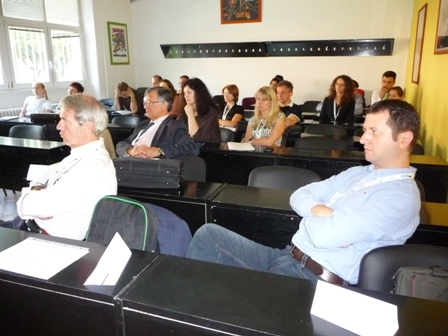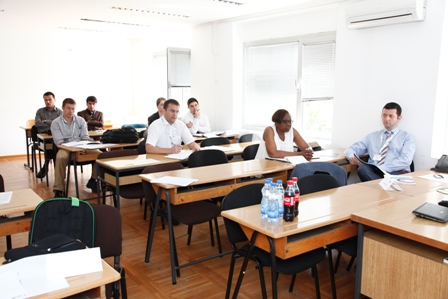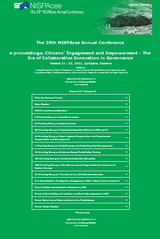| WG_News :: About WG :: Coordinators :: Activities :: WG_outputs |
The aim of the Working Group is Public Administration Education in its broadest sense (curriculum development, curriculum technology, e-learning, teaching technology, best practices, research on education, quality assurance, modern management of public administration programmes, international accreditation, etc.). The Working Group also focuses on those interested in the management of public administration education because they are in charge of public administration programmes, manage public administration departments or like to share experiences with public administration teaching. Over the years, the Working Group has hosted a variety of presentations and debates concerning higher education in the field of public administration, as well as presentations by relevant stakeholders from specialised international organisations as EGPA, EAPAA, NASPAA, and ASPA. This Working Group is striving to offer a comparative view of the way in which higher education in the field of public administration is perceived and implemented at international level and to offer best practices for universities and countries which are searching to improve their current situation.
For the 2022 Conference, the coordinators propose a special focus on the capacity of PA programmes to adapt and react to the changes of the environment. We are facing more and more challenges in key areas as: the content of curriculum, the methods of teaching, the relationship with the students, the digital transformation, the new management requirements and internationalisation. The pandemic crisis only highlighted the need for a flexible and adaptive approach of professors and managers working in PA Schools and programmes. We would like to analyse and discuss possible solutions and approaches to the challenges. The Working Group intends to publish, in the long run, an edited book on this subject. The volume might include analyses of these challenges as they apply to various geographic locations, as well as trans-national analyses on this subject.
Activities in 2021
WG Programme Coordinators:
Calin Hintea, Babes-Bolyai University, Department of Public Administration, Cluj-Napoca, Romania
Place: 29th NISPAcee Annual Conference, Ljubljana, Slovenia
Date: October 21-23, 2021
Main theme of the conference: "Citizens' Engagement and Empowerment - The Era of Collaborative Innovation in Governance"
9 papers were presented in the frame of 3 working group sessions:
The Public Administration Education working group was active during the NISPAcee conference in Ljubljana, 2021. We held one online panel, during which 5 papers were presented. Both online and offline panels were active and interesting and the participants were involved in lively discussions. The quality of the papers was very good and, due to the limited number of participants present in physical form, there was enough time for interesting debates
-
Calin Hintea, Babes-Bolyai University, Department of Public Administration, Cluj-Napoca, Romania, hintea@fspac.ro
-
Roger Hamlin, Michigan State University and Babes-Bolyai University, hamlin@msu.edu
Main Focus and Working Aims:
This Working Group is striving to offer a comparative view of the way in which higher education in the field of public administration is perceived and implemented at international level and to offer best practices for universities and countries which are searching to improve their current situation.
Specific goals:
Guidelines for contributors:
Papers can address the field of higher education understood in a broad fashion – this means that authors can address both traditional forms/programmes in higher education as well as training for civil servants, online learning, open courses, etc.).
WG Programme Coordinators:
Calin Hintea, Babes-Bolyai University, Department of Public Administration, Cluj-Napoca, Romania
Roger Hamlin, Michigan State University and Babes-Bolyai University
Place: 27th NISPAcee Annual Conference, Prague, Czech Republic
Date: May 24-26, 2019
The working group on Public Administration Education hosted 15 papers in four sessions:
Session 1: From Policy Design to Policy Practice in the European Integration Context (ERASMUS+ Jean Monnet Project PRACTIC)
Session 2 / Session 3 / Session 4
The presenters came from 9 different countries including Romania, Russia, Hungary, Austria, Slovenia, Poland, Kazakhstan, Latvia and the United States. They represented 13 different universities.
A wide variety of important issues were discussed including pedagogy, curriculum, competencies, gender issues in education, as well as student motivation, success and wellbeing. University education vis à vis the UN sustainability goals was discussed in 2 presentations.
In general, the focus was on critical issues facing PA education as well as the conference theme.
WG coordinators of the WG agreed that there has been a general improvement in the quality of papers over the years and that the papers in 2019 were generally very good. This might be, in part, because many WG participants return each year, refining their research and learning from the WG discussions. The WG has become a small community inside NISPAcee.
WG Programme Coordinators:
Calin Hintea, Babes-Bolyai University, Department of Public Administration, Cluj-Napoca, Romania
Roger Hamlin, Michigan State University and Babes-Bolyai University
Place: 26th NISPAcee Annual Conference, Iasi, Romania
Date: May 24-26, 2018
The Working Group on Public Administration Education held three sessions. The theme of the working group, in addition to the overall conference theme, was "Critical Issues in Public Administration Education.”
Session 1 began with the co-chairs discussing these themes and laying the groundwork for the discussions to follow. During the sessions, representatives of six countries presented 12 formal papers.
All of the papers that were presented made important contributions to knowledge. Presentation time was controlled to allow for discussion, and substantial, meaningful discussion was part of each session.
In addition, the presidents of NASPAA, and NISPAcee, the Secretary General of EAPAA, the NISPAcee immediate past president, and past president of ASPA, who is the International Director of the ASPA National Council were also present in the working group sessions and made formal or informal presentations or updates which generated considerable discussion.
Papers and discussions covered topics on universities’ responses to market demand, teaching methods, mid-career training programmes, public administration competencies, accreditation and the ranking of public administration programmes.
Many members of the audience of the working group participated in more than one of the three sessions, such that a continuity of discussion was present. In fact, many were repeats from the sessions in Budapest, Tbilisi, and Kazan, indicating the development of a true, core working group on education within NISPAcee. Attendance was good except for the Saturday morning session.
In general, the working group was a current success and is successfully developing an ongoing agenda of discussion.
Calin Hintea, Babes-Bolyai University, Cluj-Napoca, Romania
The coordinators of the WG on Public Administration Education received 26 papers for evaluation. 21 papers were accepted for the Kazan conference panels.
The papers presented were generally very good in terms of quality and referred to very different topics of teaching public administration in different countries. The only problem related to quite a low number of papers presented at the conference.
The coordinators intend to continue the working group in next year’s NISPAcee conference and to encourage more members to submit papers on the topics related to teaching and research in public administration.
Calin Hintea, Babes-Bolyai University, Cluj-Napoca, Romania
Roger Hamlin, Michigan University, USA
Of the 23 papers, 19 were accepted for presentation. Ultimately 14 were scheduled for presentation. They were scheduled into four sessions, one session on Thursday afternoon, two on Friday and one session on Saturday morning.
Alan Rosenbaum, Past President of ASPA was, at one point, scheduled to present to the working group and was shown in the preliminary schedule of sessions. His presentation was in addition to the 14, but he became ill and cancelled.
The 14 scheduled papers were fairly high quality. Two were follow-ups to research presented to the working group in previous years. The scheduled papers came from 10 different countries.
The topics address student and faculty development, mid-career training, and the application of technology to education, to name but a few subjects.
So, the geographic breadth and subject matter variety were good.
Two of the 14 presenters did not show up and did not notify us that they would not. One was from Budapest and one from Kazan.
One paper scheduled for the second session on Friday from the Russian Federation was moved to Saturday morning.
The presentations were good to excellent. They stayed within their time allotment and generated interesting discussion.
A substantial audience attended each presentation and provided significant discussion. Many members of the audience are regulars of the working group and attended multiple sessions. These attendees are often former presenters from this and previous years. This adds some continuity to the discussion and a feeling of building a knowledge base.
For the first session on Thursday the small room was very full with more than 25 attendees. Somewhat fewer attended on the Friday, but discussion was good. In the second Friday session, the discussion went well beyond the one hour allotted. Somewhat surprisingly we had 19 attendees for the early Saturday morning session and discussion was very good.
We asked all the presenters to send a 5 to 10 sentence summary of their papers for possible inclusion in an EAPAA newsletter. Some presenters have sent full papers since the conference. There may be some good papers for consideration by the NISPAcee journal.
We have now been co-chairs of the Working Group on Public Administration Education for many years. We feel that we are building interest in the working group, the quality of presentations and a resulting knowledge base.
Calin Hintea, Babes-Bolyai University, Department of Public Administration,luj-Napoca
Romania
Roger Hamlin, Michigan University, USA
The theme of the working group, in addition to the overall conference theme, was "Critical Issues in Public Administration Education.”
Session One started with the co-chairs discussing these themes and laying the groundwork for the discussions to follow. During the sessions representatives of eight countries presented ten formal papers. Two presentations listed on the program were "no-shows. "
All of the presentations were of high quality. Substantial discussion was a part of each session.
In addition, the presidents of ASPA, NASPAA, EAPAA and NISPAcee where also present in the working group sessions and made informal presentations or updates and generated considerable discussion.
Papers covered topics on teaching methods such as case studies and concept maps, mid-career training programs, public administration competencies and accreditation.
Many members of the audience of the working group participated in several of the five sessions such that a continuity of discussion was present. In fact, many were repeats from the sessions at Budapest indicating a development of a true, core working group on education within NISPAcee.
Calin Hintea, Babes-Bolyai University, Department of Public Administration,luj-Napoca
Romania
Roger Hamlin, Michigan University, USA
The Working Group held four sessions at the 20th Annual NISPAcee conference in Budapest, Hungary. A total of 10 papers were presented in English.All papers had a great deal to offer the NISPAcee community and advanced the understanding of Public Administration education in Central and Eastern Europe.
Paper presenters were from eight countries, Bulgaria, Hungary, Latvia, Lithuania, Romania, The Russian Federation, Slovenia, and the United Kingdom. They represented eight different universities and institutes. Coordinators were from Romania and the USA.
Generally, about 20 people attended the working-group sessions. Several active working-group members came to all sessions and participated in all discussion. In addition to the countries and universities represented by the paper presenters, participants also represented international organizations such as EAPPA and NAPAA. The president of NAPAA in the US attended all sessions.
The working group started its discussion with a full session discussion of the preliminary findings of the EAPPA’s long-term evaluation of accreditation in CEE.
Nearly all working-group sessions discussed aspects of competencies required by public administration graduates in CEE. Two papers discussed general competencies; one paper was a conversation about teaching English to PA students in Russia and how that leads to more general discussion of PA competencies. One paper looked at comprehensive HR Development in public administration. One paper looked specifically at training of future public administrators in information security issues, a growing area of needed competence. One paper looked at the subject from the point of view of employer branding.
One paper provided a thorough research effort to evaluate PA education from the point of view of the student.
Preliminary conclusion of the working group’s discussions were that much more needs to be done to comprehensively define the competency needs of public administrators, keep competencies up-to-date, and integrate that discussion into the accreditation process to make accreditation more competency-based.
For next year’s conference, the working group would like to define and discuss the most critical issues facing public administration education over the next 10 years.


Calin Hintea, Babes-Bolyai University, Department of Public Administration,luj-Napoca
Romania
Theo van der Krogt, EAPAA (European Association for Public
Administration Accreditation), University of Twente, Enschede, The Netherlands
The Working Group was organised paper sessions and training sessions at its meeting during the 20th NIPSAcee conference, May 23-26, 2012 in Ohrid, Macedonia.




 Price:
Price: 









